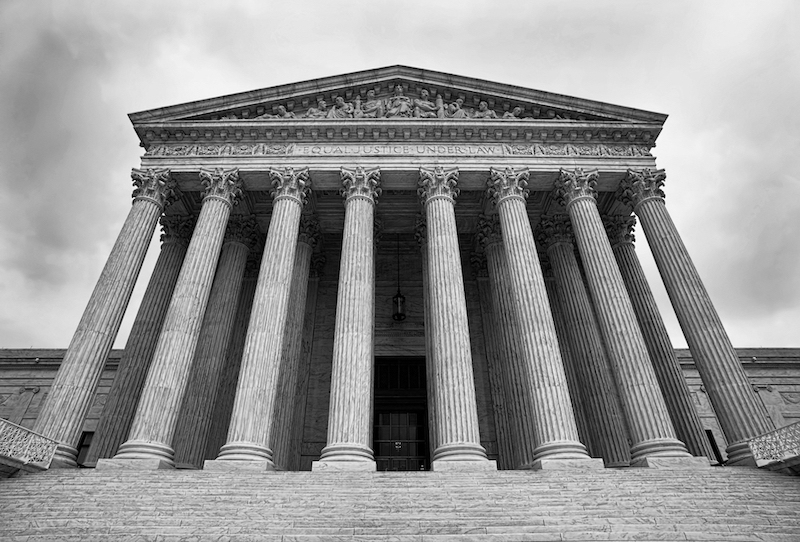This article looks at three different cases by the Supreme Court, two already decided and an upcoming decision, that have the potential to remake or undo the “administrative state”, as conservatives like to call it.
Effectively, the Supreme Court is mandating that Congress legislate only in the way it authorizes.
It’s less attacking and more plucking away at it’s flower petals saying, “He loves me. He loves me not” while thinking of late stage capitalism.
Mmm, nah, it’s an attack. The Cato Institute says as much when it in an amicus brief it filed with the Supreme Court:
Chevron is unconstitutional for several reasons. It gives judicial power—the power to interpret the meaning of the law—to the administrative state within the Executive Branch. The Constitution, however, grants all judicial power to the Judicial Branch. Chevron is also unconstitutional because it biases the courts towards the agencies, stripping the judiciary of impartiality and denying litigants basic due process. But a third reason, and the focus of our brief, is that Chevron deference is ahistorical, arising not out of the original understanding of the Constitution but rather out of the administrative bloat of the New Deal era.
The explicit goal of elite conservatives is to undo the “administrative bloat of the New Deal era”, widely regarded as one of the best periods in American history and the foundation of many of the legal protections we have today.
All of this is quite concerning, and the situation is likely to get even worse. In Loper Bright Enterprises v. Raimondo, the Supreme Court will decide whether a legal rule known as the Chevron doctrine should be abandoned. The Chevron doctrine, named after the 1984 Supreme Court decision creating it, states that reviewing courts must defer to an agency’s interpretation of a law used to justify a specific enforcement action, such as a rule-making, so long as it is “reasonable.” In other words, the Chevron doctrine is about judicial humility: It says that courts should not evaluate the soundness of particular agency policies.
This is a gross mischaracterization. The Chevron decision states that the court should first refer to whether the statute written by congress answers the specific question at hand.
First, always, is the question whether Congress has directly spoken to the precise question at issue. If the intent of Congress is clear, that is the end of the matter; for the court, as well as the agency, must give effect to the unambiguously expressed intent of Congress.
If it does not, the court should defer to the agency’s interpretation of the statute so long as the interpretation is permissible, e.g. does not contradict the letter of the law.
If, however, the court determines Congress has not directly addressed the precise question at issue, the court does not simply impose its own construction on the statute . . . Rather, if the statute is silent or ambiguous with respect to the specific issue, the question for the court is whether the agency’s answer is based on a permissible construction of the statute.
It does not say that the court must always defer to the agency’s interpretation of the law or that the court does not have the authority to evaluate the soundness of particular agency policies.
The gross mischaracterization seems…neither that gross nor mischaracterized. The magnitude of difference between you explanation and the first quote doesn’t seem that big to me. Then again, I’m also not a lawyer.
In any case, I don’t think this substantially addresses the article’s argument. I’ll concede that you’re right. There’s still the concerted effort to undermine the Chevron doctrine, however characterized, which grants more power to the judicial branch.
In other words, the Chevron doctrine is about judicial humility: It says that courts should not evaluate the soundness of particular agency policies.
To me, this statement sounds like the Chevron doctrine prevents courts from ruling on whether particular policies of administrative agencies conform to the law.
You don’t throw that kind of money and influence at singular people with good intentions… like ever.
https://mediabiasfactcheck.com/democracy-journal/
These media sources are moderately to strongly biased toward liberal causes through story selection and/or political affiliation. They may utilize strong loaded words (wording that attempts to influence an audience by using appeal to emotion or stereotypes), publish misleading reports, and omit information that may damage liberal causes. Some sources in this category may be untrustworthy.
You left out the part where your source says that this publication offers “HIGH FACTUAL REPORTING”.
publish misleading reports, and omit information that may damage liberal causes. Some sources in this category may be untrustworthy
Need I bold it?
This is certainly playing with words though. Trying to frame administrative law as a bastion of democracy just because it was created by congress is a severe reach no matter how you do it. It’s like saying the Byzantine emperor was selected by the senate. That’s factual, but isn’t really giving you a good picture of how things work.
Administrative law is inherently less democratic.
Administrative law is inherently less democratic.
Than what? You can argue with the article:
The claim that administrative agencies lack democratic accountability is one of the frailest arguments from conservative activists. Congress has established a plethora of checks to ensure constant and persistent accountability—something that unelected and nearly unremovable federal judges fundamentally lack. Consider that agencies do not just exist; rather, Congress must create them. Congress sets agencies’ budgets, which determine their operations. The laws agencies enforce are enacted by democratically elected members of Congress. Agency leaders must not only get nominated by the President but then be approved by the Senate. Most agencies require their leaders to meet frequently with lawmakers and submit reports to Congress explaining their recent enforcement actions.
Agencies also cannot just enact new regulations at will; they must justify them with substantial evidence. The published regulations are often hundreds of pages long, with many of those pages devoted to discussing the evidence and clearly explaining the rule and its effects.
There’s also accountability measures built into the day-to-day running of these agencies. Enforcement actions and other activities must be published in a government-wide daily publication known as the Federal Register. Agency rule-makings that enact new legal obligations require extensive public comment (in some cases extending for more than 60 days), and in limited cases, even multiple rounds of public comment. Moreover, those rule-makings and enforcement actions are eventually subject to judicial review by a circuit court of appeals. All of these processes ensure that an agency’s actions reflect the will of the people.
Congress can also negate specific agency enforcement actions with a simple majority by invoking the Congressional Review Act. And, of course, agency officials are always subject to ad hoc meeting requests from Congress, which usually occur in response to a national news event. In summary, democratic checks on agency actions are abundant.
What exactly makes all of that inherently less democratic?
More importantly, though, to the extent that it is less democratic (if it is…), is it as undemocratic as judicial power?
Yes and congress holds impeachment and appointment powers over the judicial branch, as well as the ability to hold hearings to investigate them. NEITHER are inherently democratic. A bill creating law is democratic, administrative law is efficient.
So they’re biased towards reality, and not conservatives’ fantasy world…
It’s interesting that you interpret a bias of any form as realistic.





